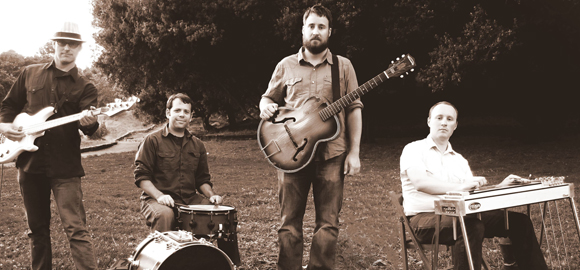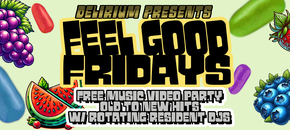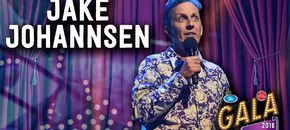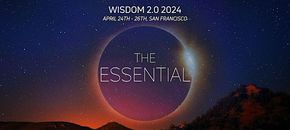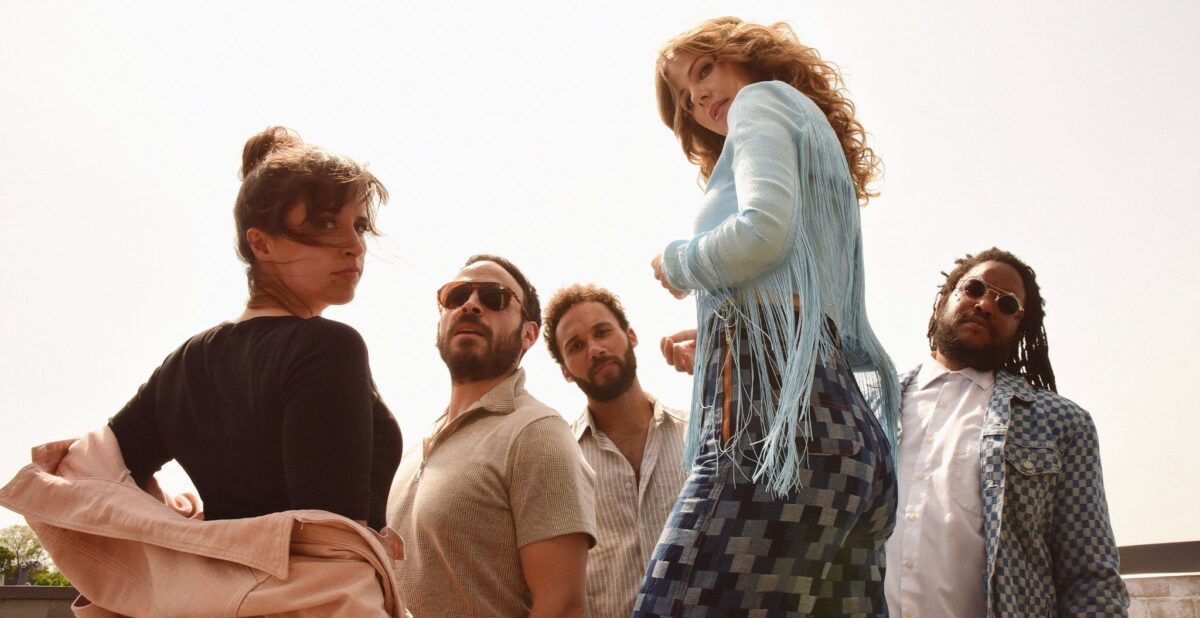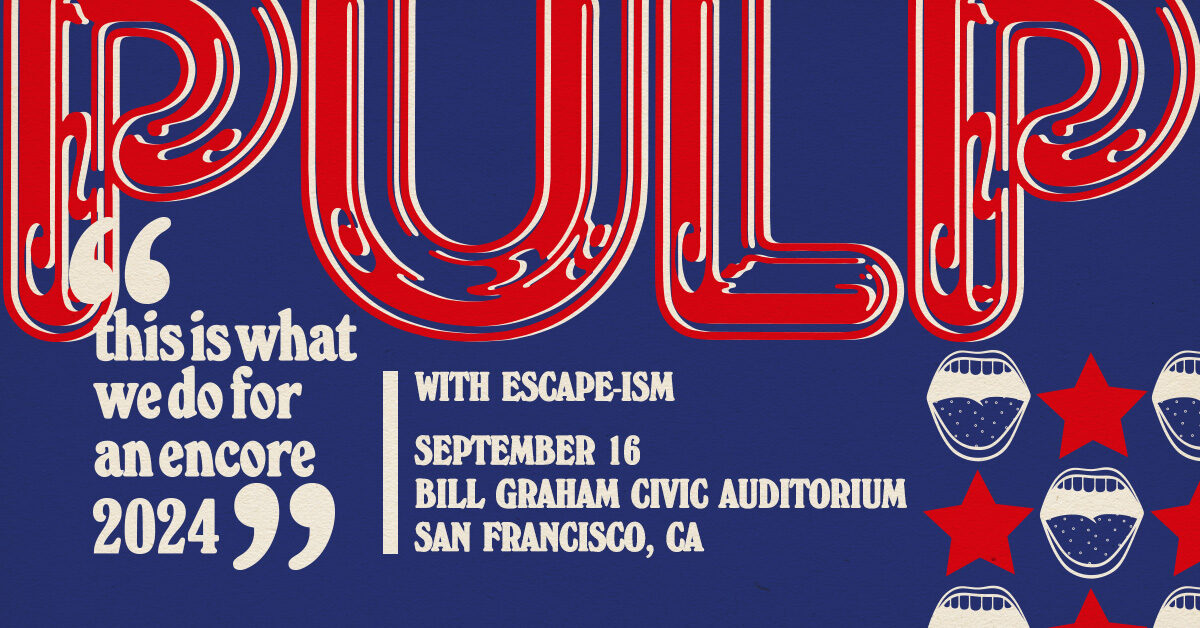Homegrown: The Shants
A band is an entity unto itself. Individual. It is more than its members, their histories, and even their creative DNA. Although Skip Allums is from Louisiana, his band The Shants (Oakland, CA) was born right here in Northern California. Homegrown, and the number of us all too eager to claim them as our own is multiplying.
[audio:/wp-content/uploads/2011/09/06-Brother.mp3]“Brother” The Shants
As an individual, The Shants’ lifespan is minuscule and impressive. In 2009, Allums teamed up with Sam Tokheim (pedal steel), Adam Burstein (drums), and Carver Cordes (bass) to record the EP, Russian River Songs (High Scores & Records). As any of us who have started a band expect (but very few experience) the EP was immediately praised by Filter and No Depression. With their full length debut, Beautiful was the Night, set for release September 27, the band is about to garner more praise. The album maintains the haunting, meandering sound from the EP that made me want to root for The Shants, but tracks like “Brother” (available for stream at the top of the article) and the closer “(I’m Not) Gonna Waste Another Song on You” reveal a brass swagger.
This swagger is a conversation-changer. Before the album I might say, “Check out The Shants,” if someone was looking for some new local music. After hearing Beautiful was the Night, I am initiating the conversation. And that’s the difference between a good band destined to stagnate and a great band that’s on the move.
Allums and I have been going back and forth over email over the past week. When a songwriter is as articulate as Allums is with his responses, it’s best just to let the man speak for himself. The Shants album release party is Saturday, October 8 at Viracocha. For more info, head over to their website.
This album is a tribute to Louisiana—did you write most of these songs here in California?
All but one of the songs were written here (California). “You Win” was written while I was at LSU (Louisiana State University). (It is) generally about losing yourself in the French Quarter to drown your sorrows. All the rest of the songs either address Louisiana or speak for her, what she’s been through; where she’s going…
What role does distance play in having a perspective to a write a song? Many writers talk about needing time to gain a perspective, but I wonder what role physical distance from the subject matter has on the writing process.
It’s definitely taken moving away for me to be able to write about my experiences back home. It’s given me the space to write about these places, as opposed to writing about getting away from these places. The relationships I have with these towns, juke joints, people, etc. are complex and bittersweet. Time gave me the clarity to see how coming up there shaped me…personally and as a musician.
What events led you from Louisiana to California?
A long chain of events really, but mostly wanting to get away from the oppressive weather and lack of support for the music scene. That’s all changed now, and there’s lots of great stuff happening in my old haunts like Baton Rouge & Lafayette. These days, I would actually consider moving back. If you’d asked me that 10 years ago, I’d have told you “no fucking way”. My dad lived here when he came back from Nam in ’68. He stayed with my aunt in North Beach and spent a few weeks camping in Yosemite. He used to tell me how great Northern California was, and so it was always in the back of my mind. As soon as I graduated, I packed up my Saturn and hit I-10.
Seeing as the title of the album comes from a Longfellow epic and just how you describe these songs, I’m guessing the literary world contributes quite a bit to your work. Do you try to apply the ideas you read about to your experiences and songs, or do you use the poetry and literature as an escape from your own experiences (both when writing music and in general)?
Longfellow’s “Evangeline” is taught to every child in Louisiana public schools. It’s as close to our souls as Romeo & Juliet or The Crucible. It’s a wistful love story, bit it also chronicles the strife that the Acadians (now Cajuns) had to endure when they were kicked out of Nova Scotia by the English. When we were prepping for the studio and thinking about arranging the songs, I dug my copy of the book out and read over a few passages. It’s interesting how the Cajuns’ tribulations are similar to what Katrina evacuees went through, or the fishing villages ruined by the oil spill. History definitely repeats itself. It’s just new actors remaking an old movie. Anyway, one passage jumped out at me in particular:
While Evangeline stood like one entranced, for within her
Olden memories rose, and loud in the midst of the music
Heard she the sound of the sea, and an irrepressible sadness
Came o’er her heart, and unseen she stole forth into the garden.
Beautiful was the night. Behind the black wall of the forest,
Tipping its summit with silver, arose the moon. On the river
Fell here and there through the branches a tremulous gleam of the moonlight,
Like the sweet thoughts of love on a darkened and devious spirit.
Nearer and round about her, the manifold flowers of the garden
poured out their souls in odors, that were their prayers and confessions
Unto the night, as it went its way, like a silent Carthusian.
It’s a striking passage, but not just for its lonesome-ness, but also in how well it captures the heavy feeling of the Atchafalaya at night. The air has a sweet tension to it. It’s extraordinary. We’ve tried to capture that in songs like “The Fire” or “Full Circle”. The phrase itself to me means that even the darkest night can be a comforting thing.
Does songwriting help you deal with/embrace issues, questions, problems, and/or pleasures; or does it only help crystallize the issues, questions, problems, and/or pleasures?
I’d say it’s a little of both. Some songs give voice to feelings I would rarely talk about in everyday conversation. Other songs are just open letters to people or places I care about – this is what we’ve survived in life, it’s getting better every day. There’s a lot of hope in this record, under the surface of all the moping. Ha!
What was the first image, experience, question, or nugget from which this album grew?
The song “Baton Rouge”. That song was the first time I sat down and said, “Alright, I’m gonna be honest and write how I really feel about my hometown.” From there, the other songs just came out, either from preparing for the studio of from our days on the road…but they all seemed to fit into this suite of music, if you will, with The South as its base, either in lyrical form or influence of country & blues.
Phil Lang is the Director of Music Operations at BAMM.tv (Beta). BAMM.tv curates, produces, and globally distributes performance video content of the best unknown artists. Built by musicians for musicians, BAMM.tv shares net profits 50/50 with the artist through a fair share arrangement that benefits everyone. For more information, email [email protected].
